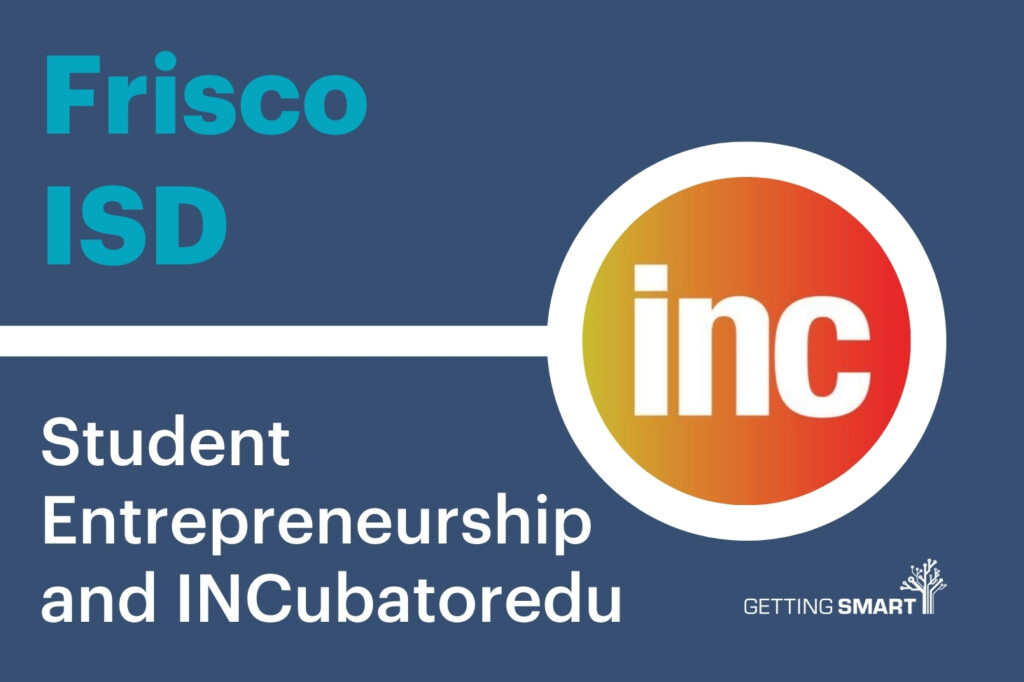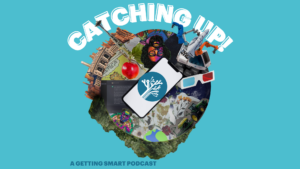Frisco ISD on Student Entrepreneurship and INCubatoredu
Key Points
-
Entrepreneurship doesn’t have to be the initial goal to have a large impact.
-
Pivoting in a project is part of the project lifecycle.

On this episode of Getting Smart Podcast Victoria Andrews discusses student entrepreneurship with an awesome group from Frisco ISD. Tommy Thompson teaches Marketing, Entrepreneurship and Finance Classes, as well as the DECA sponsor in Frisco ISD. Before teaching he worked in the corporate world for 18 years, started his own business, and served as an industry volunteer in the INCubatoredu program at Centennial High School which he now teaches.
We’re also joined by two students: Rupa Kumaran, the founder of Infiniti Board, a Board Game for Neurodiverse individuals and Esha Bandi, the founder of MyCourseWay, a company that digitizes a school’s entire course catalog.
Transcript
Victoria Andrews: Hi, you’re listening to the Getting Smart podcast. I’m Victoria Andrews, and I am joined today by two of the most amazing students I’ve met in quite a while, along with their amazing teacher. At Getting Smart, we’ve been thinking about how entrepreneurship and the different skills students learn impact their lives. We know that well over five million people are engaged in entrepreneurship in some regard, and even if they don’t continue with it, they learn so much. It’s the exposure to being able to create an idea, craft it, sell it, ideate—all of those pieces. Some people wait until they go through a business course or might work for a relative, but some start even earlier than that.
Today, I am joined by Mr. Tommy Thompson and two of his students, Roopa Kumarin and Isha Bandi. They will share their experiences as students in the entrepreneurship program and how they developed their own businesses. Welcome to the show!
Isha Bandi: Hi, thank you! It’s so good to be here.
Victoria Andrews: All right! Mr. Thompson, I’d like to start with you. We were chatting about your journey into the incubator program, and we know you didn’t start off as a teacher. Could you tell us a little about your role and how you supported the program?
Tommy Thompson: Yeah, sure. The incubator program started in Frisco ISD in 2018, and I happened to see a tweet about needing mentors and community champions. I responded to that, attended a kickoff, and was assigned to Centennial High School—where my son also graduated from, so I was familiar with the school. It interested me because they were giving students the opportunity to create businesses, which I thought was really cool. At the time, I had just come out of my private business. I had been in the corporate world for 16-17 years and was also a realtor, so I jumped at the opportunity to help.
Victoria Andrews: Love that! So, can you tell me a bit more about how you supported the incubator program? You weren’t a teacher initially, correct?
Tommy Thompson: Correct. I came in as a mentor, but I quickly became a community champion, helping the assigned teacher bring in individuals from the community to work with the students. That’s a key part of the program’s success—we need community support. The teachers can’t do it alone because many don’t have the business world experience that community members can bring. That experience is invaluable.
Victoria Andrews: And once you got into the classroom as a community champion, you loved it so much that you said, “I have to do this every day.”
Tommy Thompson: Exactly! I loved it. We had two years before COVID hit, and during that time, I was in and out of the classroom, working with the teacher, Ms. Locke. After COVID slowed things down, Ms. Locke took a new position at another school, and I saw an opportunity to get my teacher certification. It took about a year, and after that, I took over the program full-time. I’ve been teaching for two years now.
Victoria Andrews: That’s fantastic! You’ve experienced both sides, being a community member and now a teacher, which really highlights how the role of a teacher has shifted. It’s not just about teaching and leaving for the day. You bring your background and expertise to the role, and it’s great to see how that benefits the students.
Tommy Thompson: Absolutely. The students really respond to it.
Victoria Andrews: All right, let’s get to the business side of things. Isha, can you share your business idea with us and walk us through your journey of building it?
Isha Bandi: Of course! The business I started is called My Courseway. It’s a district-based application that simplifies the course catalog for students. Typically, students select their classes using a course catalog, which is often a hundred-plus page PDF that’s difficult to navigate. What My Courseway does is make it searchable and filterable, so students can easily find the courses they’re interested in. It also shows which colleges accept certain credits, provides counselor information, and has features like an academic guide and personal profile. It just makes the whole process easier for students.
Victoria Andrews: That’s huge! Can you talk a little about the interface?
Isha Bandi: Sure! As a student, I didn’t want to read hundreds of pages of text-heavy PDFs. It’s overwhelming, and I knew there had to be a better way. So, I created an interface where you can simply search for what you’re interested in. For example, if you’re looking for a finance course, you can type in “money” and find all the relevant courses. It’s much more user-friendly.
Victoria Andrews: That’s brilliant. Can you walk us through the design process?
Isha Bandi: Absolutely. It all started in the incubator program, which is essentially an entrepreneurship course. I initially thought it would be a traditional class, but it turned out to be a lot more hands-on. You create a business from scratch using tools like the Business Model Canvas, and you go through everything—marketing, finance, advertising, and more. By the end of the year, you present your business to a panel of judges, and there are competitions throughout the year. I actually pivoted my business idea right before a major presentation, about 13 days before, because my original idea wasn’t working.
Victoria Andrews: Wow! What was your original idea?
Isha Bandi: It was called Umari, and it was similar to Apple’s Airtag. But once Airtag came out, I realized there was no way I could compete with that, so I shifted to My Courseway, which was based on my own struggles with selecting classes.
Victoria Andrews: That’s an impressive pivot. Is your school currently using My Courseway?
Isha Bandi: Yes! This year, we’re using it at Centennial High School as a beta test.
Victoria Andrews: That’s amazing—a legacy project! Roopa, can you tell us about your business?
Roopa Kumarin: Absolutely! We started our business last year, inspired by the incubator program and by seeing the work that Isha’s team had done. I came into the class thinking it would be fun, but I didn’t expect to fall in love with creating a business. Our business is a board game for neurodivergent students, including those with autism, ADHD, and dyslexia. The game helps students practice interpersonal skills, like emotional and functional skills, through real-life application situations. We saw a need for this after talking to the special education department at our school.
Victoria Andrews: Wow, that’s incredible. Did you also go through a pivot with your business?
Roopa Kumarin: Yes, we did! Initially, our idea was a heated pad that could relieve muscle pain. But after some feedback and further development, we pivoted to the board game concept. The pivot was definitely the right move, and it’s been successful.
Victoria Andrews: It sounds like it! Both of you mentioned that you didn’t originally plan to become entrepreneurs. What are some key skills or takeaways you’ve gained from the program?
Isha Bandi: For me, it’s definitely presentation skills. I’ve always been extroverted, but I had terrible stage fright. In this program, we had to present spontaneously in front of the class, and over time, I became much more comfortable. My presentation skills improved drastically, and I learned to handle unexpected situations, like when team members were absent, and I had to cover for them.
Roopa Kumarin: I agree with Isha. The class really pushed me out of my comfort zone. I was more introverted, but being forced to speak up and present my ideas helped me build confidence. Now I’m much more comfortable voicing my thoughts, which is something I didn’t do much before this class.
Victoria Andrews: That’s fantastic. It’s great that the program helped both of you find your voice and build communication skills that will serve you throughout your life. Do you see yourselves continuing as entrepreneurs in the future?
Isha Bandi: Definitely! Whether or not this business works out, I’ve realized that business is something I’m passionate about. I initially planned to go into law, but this class changed my aspirations. I see myself staying in the business world.
Roopa Kumarin: Same here. I want to continue the business and pursue a degree in business after graduation.
Victoria Andrews: That’s great to hear! Mr. Thompson, what advice would you give to someone who wants to get involved in their local school community?
Tommy Thompson: I’d encourage people to reach out to their local schools or districts. Many schools have volunteer opportunities, and community members can bring valuable experience to programs like this. Frisco ISD has a lot of programs that involve the community, and it’s a great way to support students.
Victoria Andrews: Thank you so much! For anyone listening, don’t hesitate to get involved with your local school. We’re grateful to all three of you for joining us today, and a special thanks to Frisco ISD for housing the incubator program. Congratulations to both of you on your Shark Tank success, and we wish you the best for the remainder of your senior year. Thanks for listening, and enjoy the rest of your day!
Isha Bandi & Roopa Kumarin: Thank you so much! Bye!
Links:








0 Comments
Leave a Comment
Your email address will not be published. All fields are required.